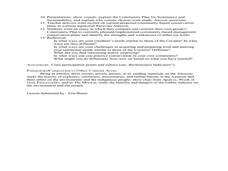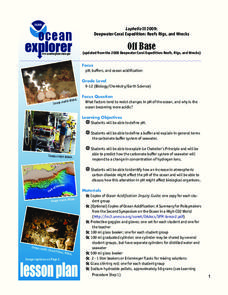Curated OER
Let's Go to the Video Tape!
Students examine biological diversity and see how it relates to the concepts of variety and relative abundance. In this investigative lesson students view a video on biodiversity and complete an activity.
Curated OER
Now Take a Deep Breath
Students research to answer questions related to deep sea diving. In this deep sea diving lesson, students answer questions on a worksheet using the Internet. They discuss pressure, gas laws, and the physiology of diving in the deep sea.
Curated OER
Supermarkets, Sustenance and Sustainability
Young scholars investigate jungles and the people who depend upon them. In this sustainability lesson, students research wild life conservation and discover the importance of a jungle to Amazonian people. Young scholars...
Curated OER
Sea Connections
Students, after locating different marine habitats on a globe, play a card game about ecosystems, food webs and organisms.
Curated OER
Now, Take a Deep Breath
High schoolers define several laws of pressure and see how they relate to scuba diving. In this ocean explorer lesson students answer questions and complete an activity.
Curated OER
Aquatic Ecosystems
Ninth graders record information on aquatic ecosystems and create a labeled diagram of an ecosystem of their choice. They can choose from an ocean zone, estuary, river, lakes, or beaches. The student has to explain their biome of choice.
Curated OER
Off Base
Students explain the Chatelier's Principle. In this pH lesson plan, students identify factors that resist changes in pH of the ocean and why the ocean is becoming more acidic.
Curated OER
What's Eating Your Ship?
Students examine the processes that contribute to the deterioration of shipwrecked in shallow and deep water. In this research lesson plan students explore shipwrecks and how the deterioration process works. Students fill out...
Curated OER
Let's Get Specific
Students explore how different species thrive. In this speciation instructional activity students research and complete a lab activity.
Curated OER
Great Blobs of Jelly!
Students explain how zoo-plankton have an impact on the global process. In this ocean zoo-plankton lesson students calculate carbon flux and plankton densities.
US Environmental Protection Agency
Epa: Coral Reefs
What is a coral reef? Why are Coral Reefs important? What is affecting the health of coral reefs? These questions are answered and more information is provided on this easily readable, comprehensive site.
Other
The Coral Reef Alliance: Why Should I Care?
Five reasons are given in this brief site that illuminates why we should care if coral reefs survive in our world.
NOAA
Noaa: Ocean Service Education: Corals
This Coral Tutorial is an excellent resource with diagrams, pictures, animations and short videos. All aspects of coral biology are discussed. As an added benefit, pdf versions of the site are available along with a subject review...
Untamed Science
Untamed Science: Biology: World Biomes: Coastal Oceans Biome
Explore photos, watch video clips, and learn about the aquatic biome located above the continental shelf. [8:37]
Nature Conservancy
The Nature Conservancy: Nature Lab
These wonderful virtual field trips allow students to explore a coastal rain forest or the coral reefs in the Dominican Republic, and so much more.
CK-12 Foundation
Ck 12: Life Science: Aquatic Biomes
[Free Registration/Login may be required to access all resource tools.] Aquatic biomes can be generally classified based on the amount of salt in the water. Freshwater biomes have less than 1% salt and are typical of ponds and lakes,...
Other
Sea and Sky: Sharks and Rays
Selected species of sharks and rays are described and illustrated with photographs.



















